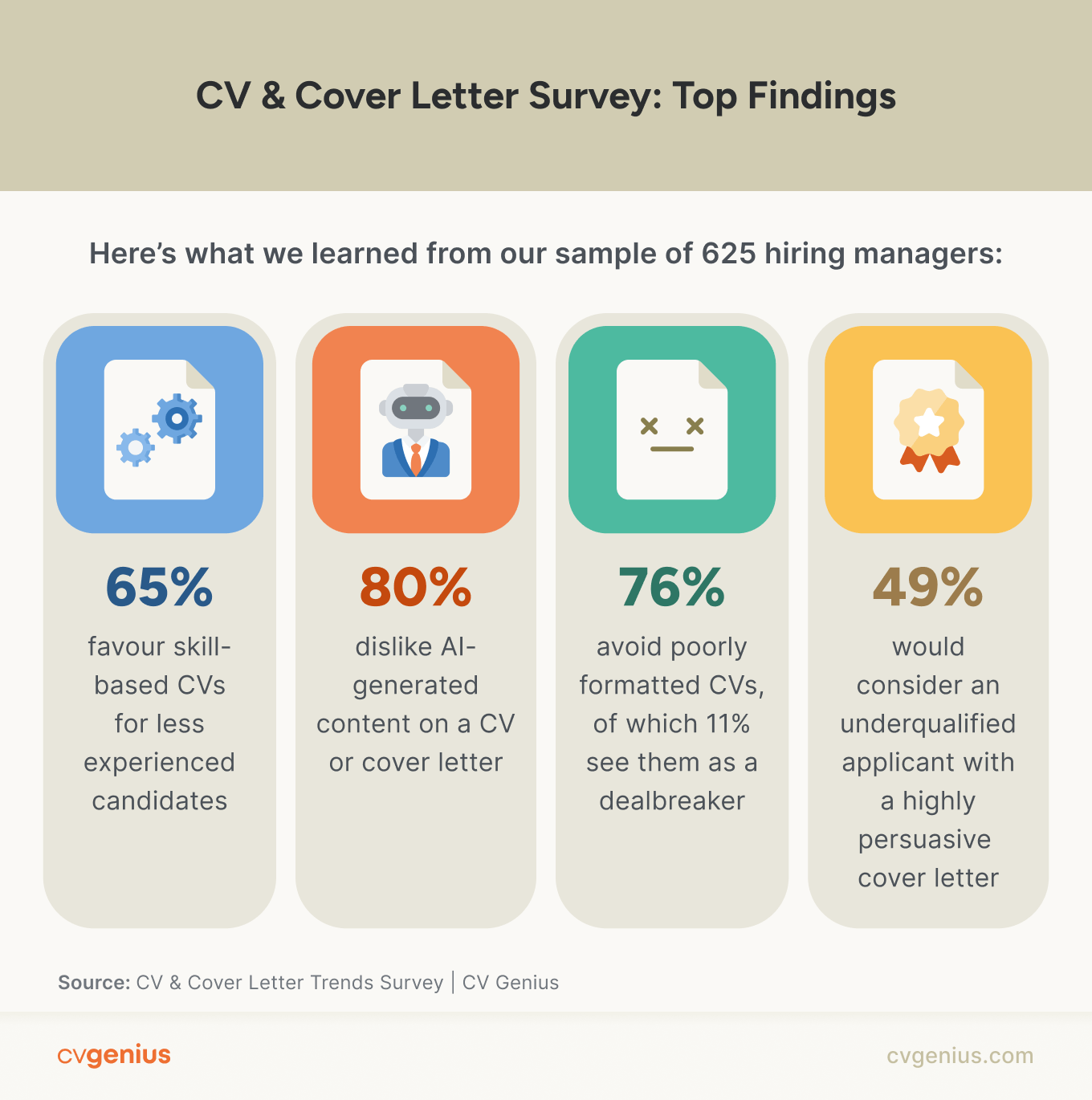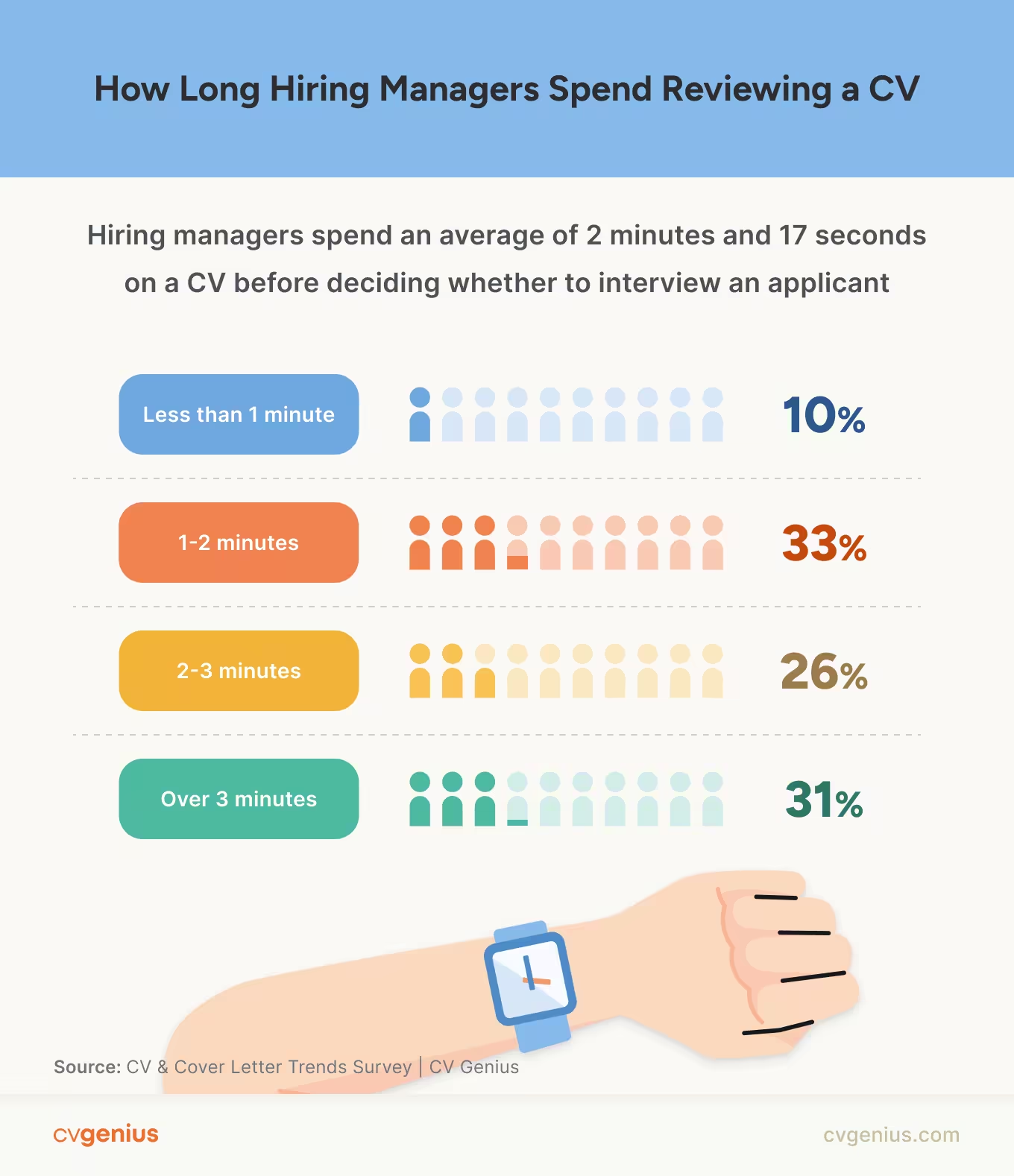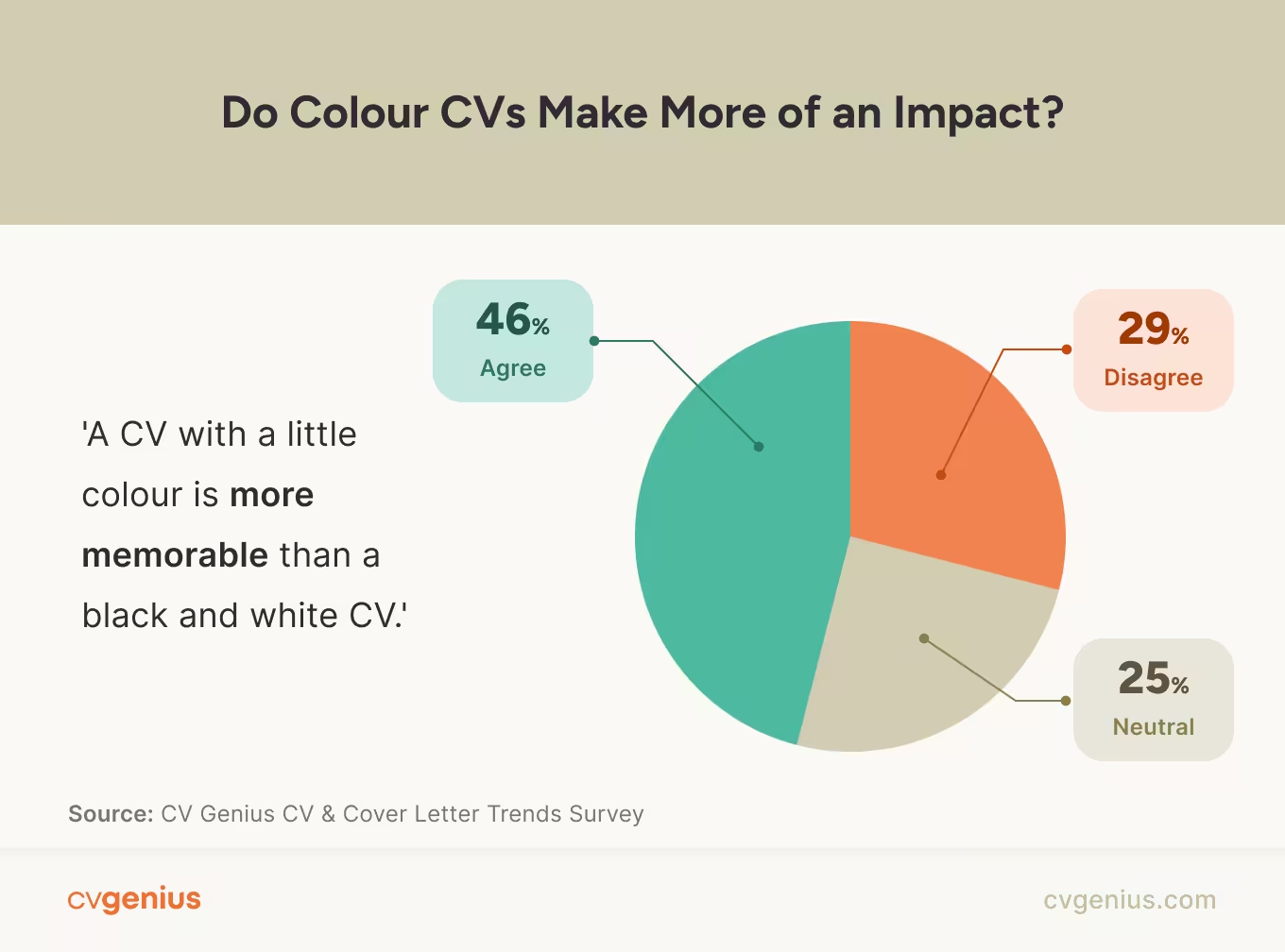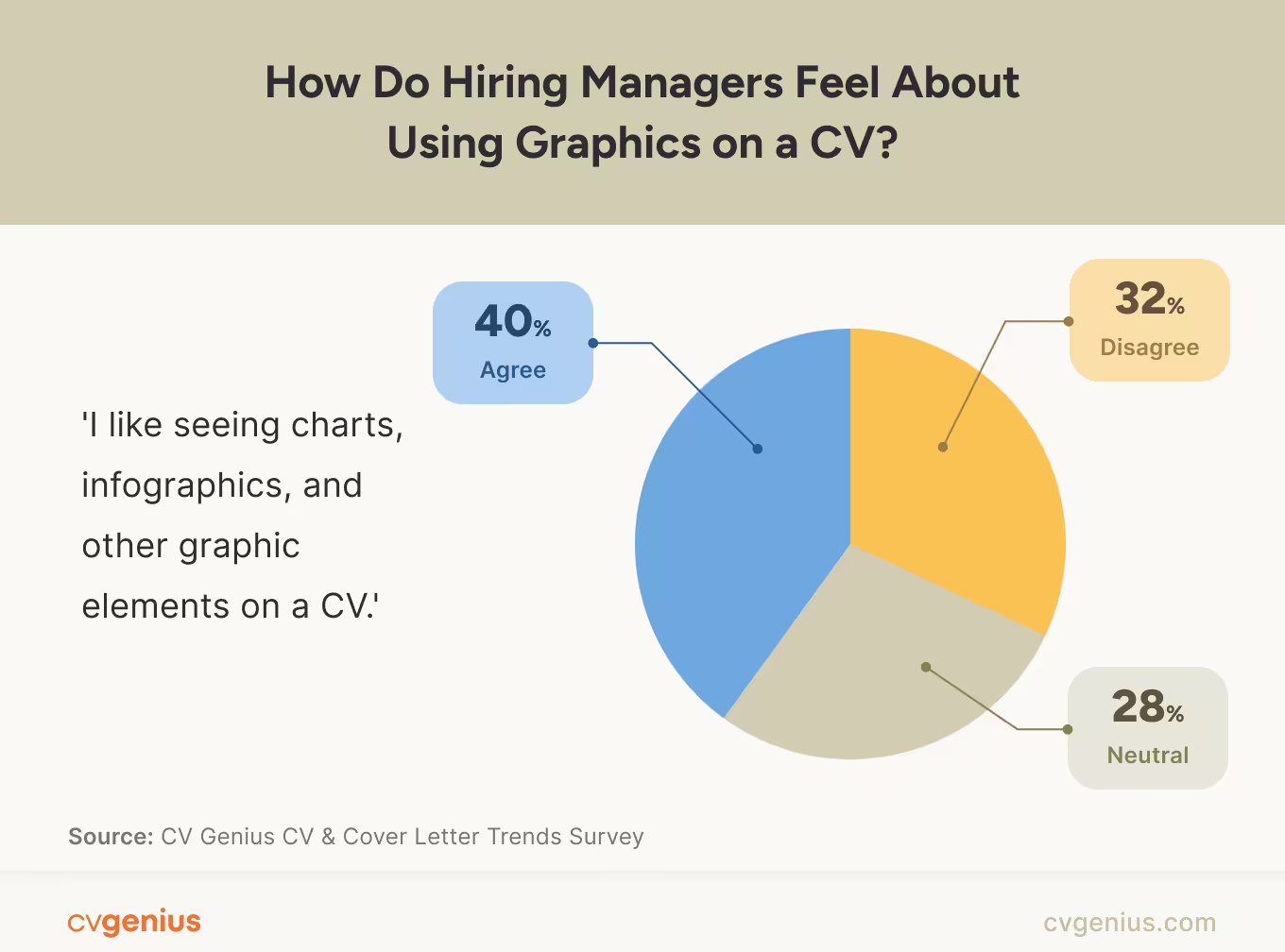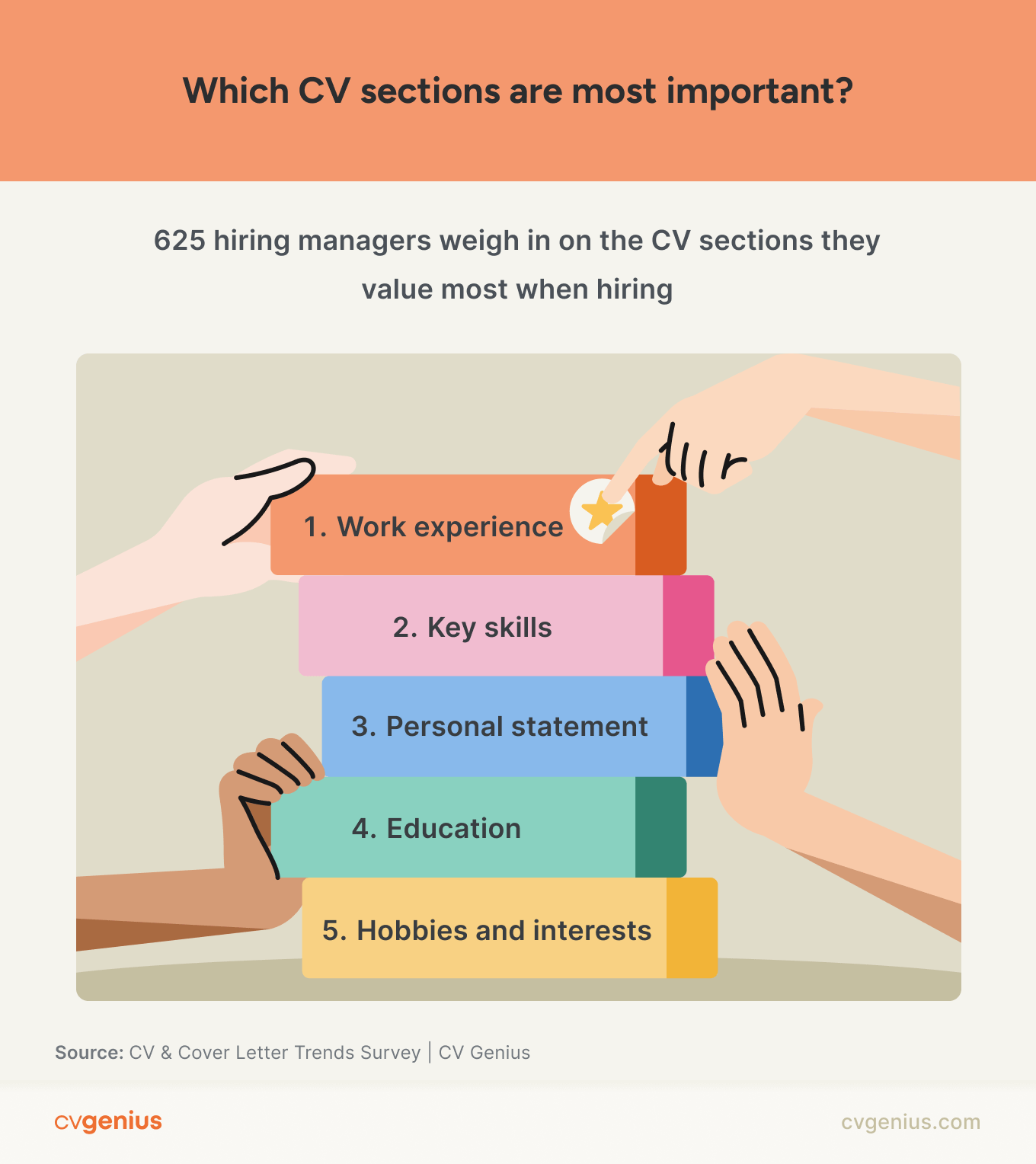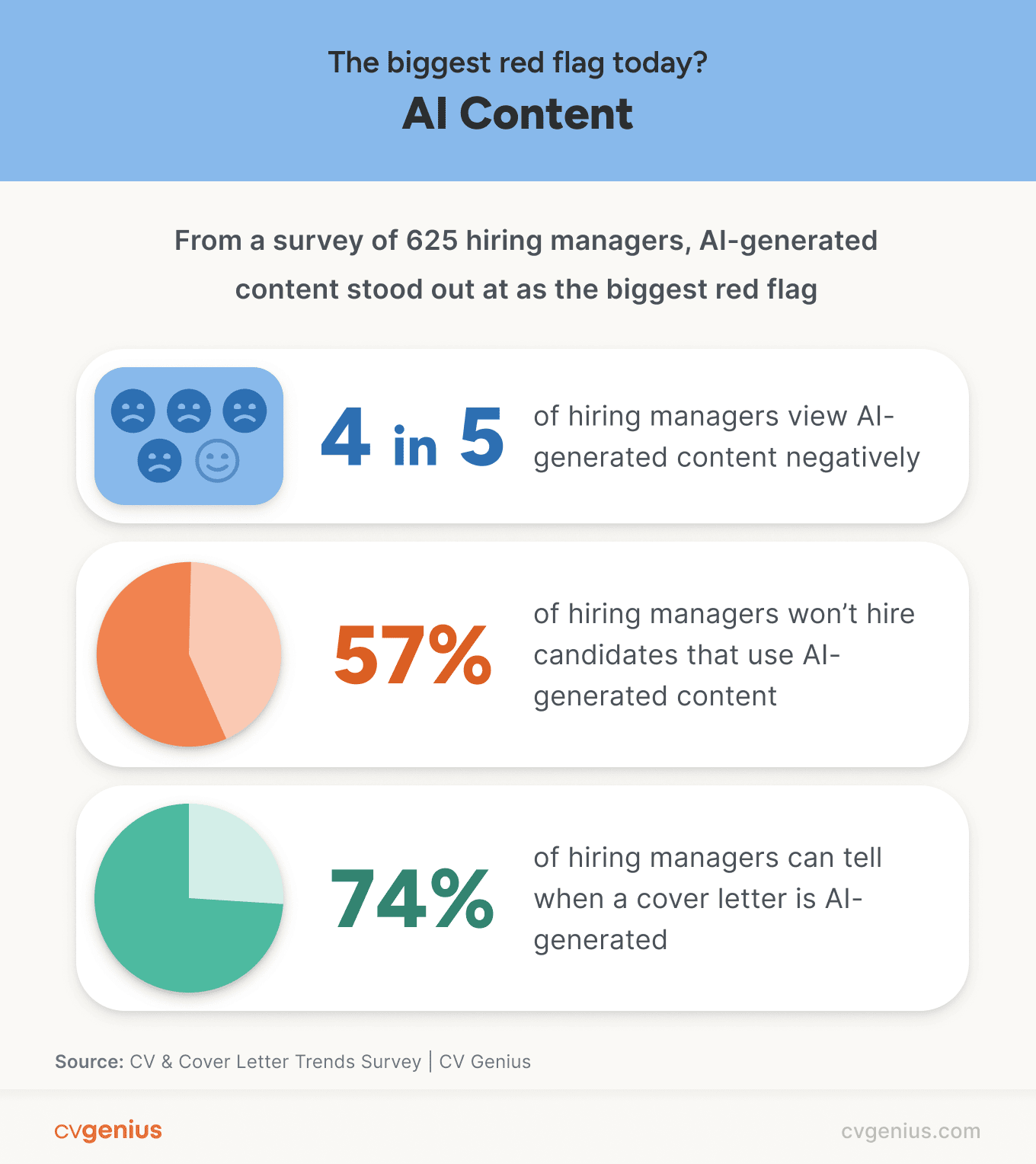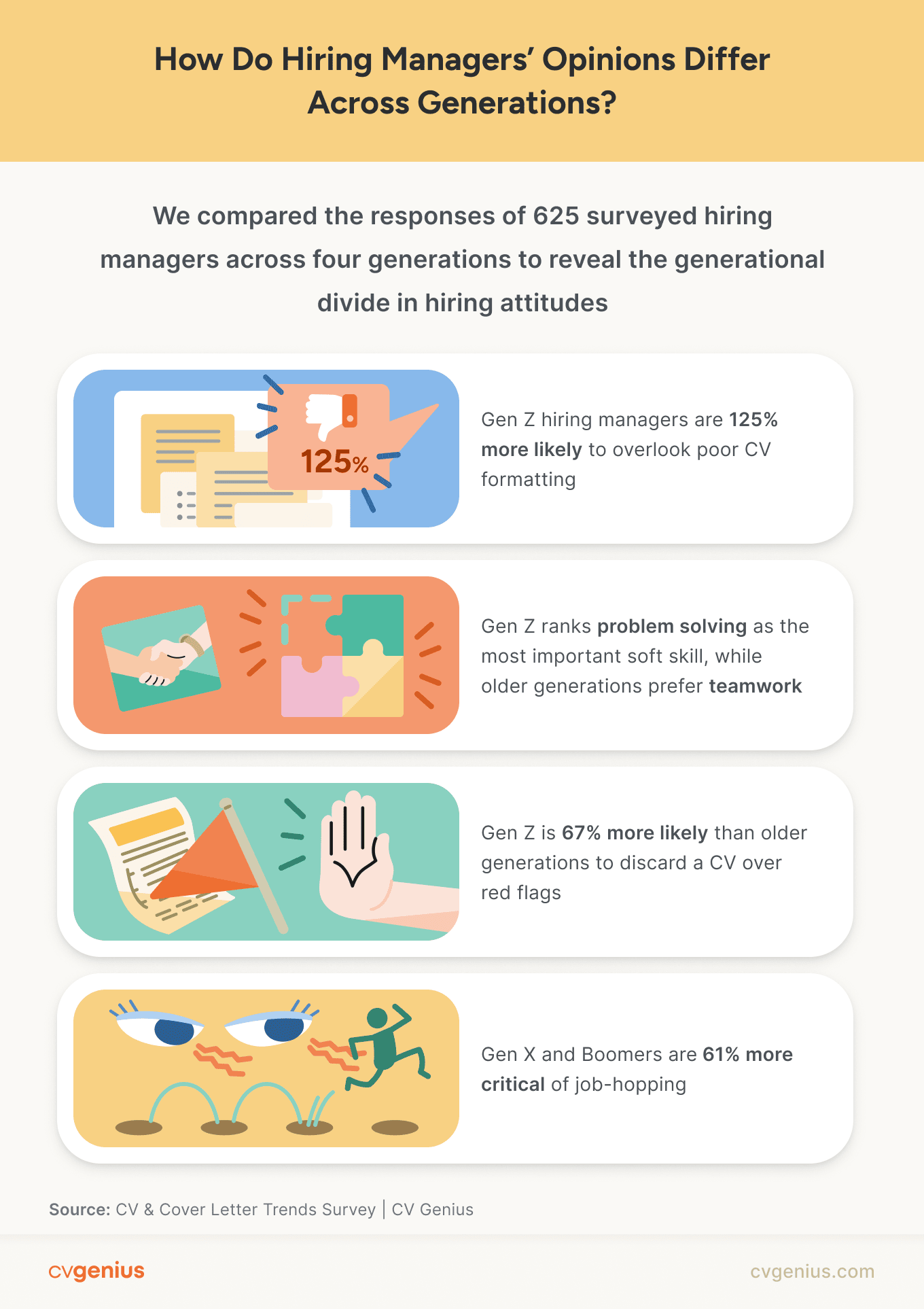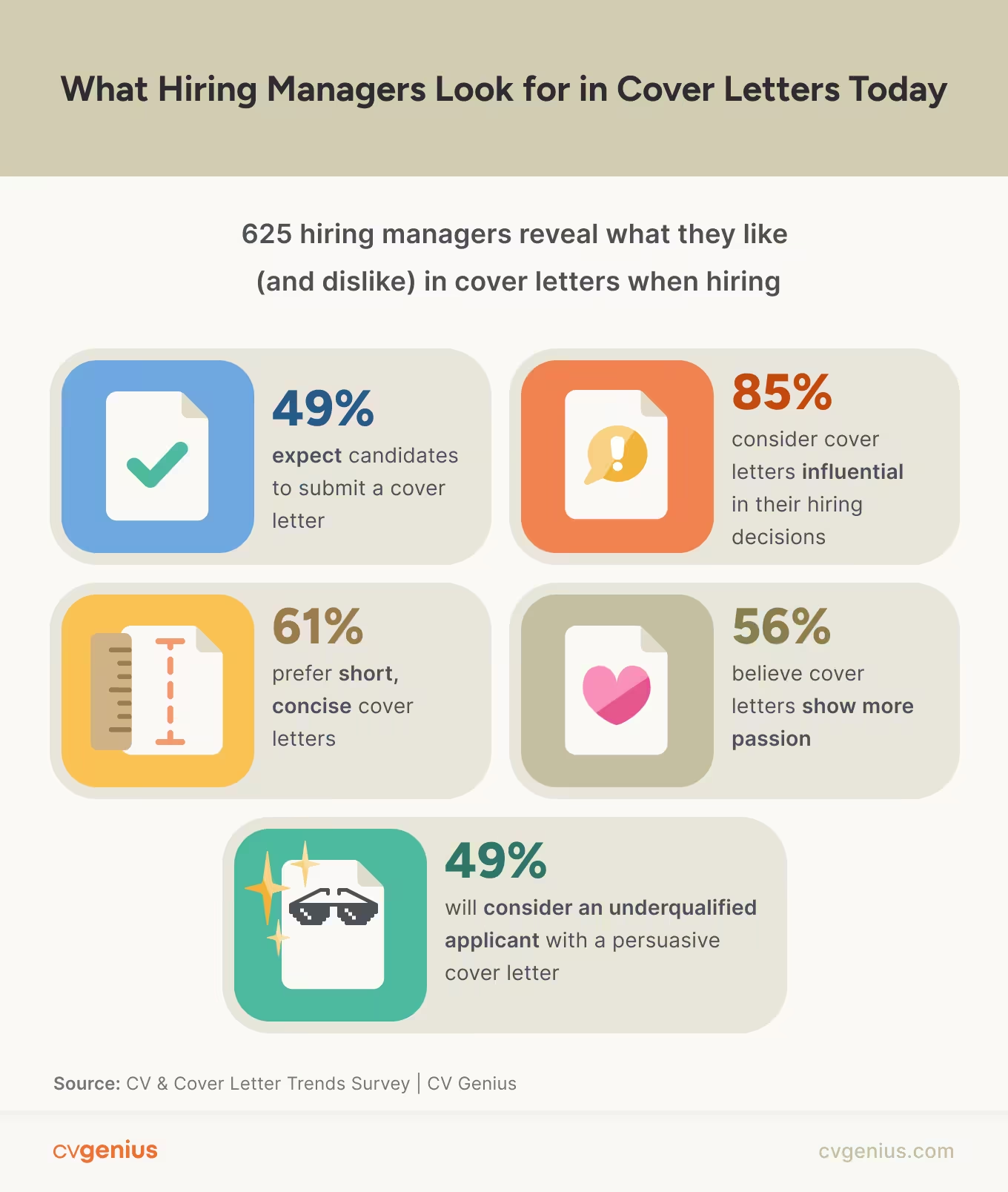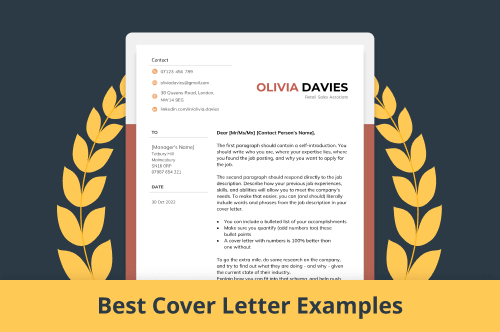What do hiring managers really want to see on your CV and cover letter?
In April 2024, CV Genius surveyed 625 hiring managers across the UK and Ireland to uncover their expectations for outstanding CVs and cover letters.
The CV & Cover Letter Trends Survey offers insights from hiring managers across various industries. To identify the best current approaches to CV and cover letter writing, we polled respondents on a range of topics, from ideal CV length to the use of AI-generated content.
Our sample both accounted for different age brackets and targeted a mix of in-house employers and external recruiters, allowing us to explore possible relationships between these factors and hiring manager expectations. Our analysis revealed the following insights:
Average CV review time is longer than you think
One of the most widely shared myths about CVs is that hiring managers only spend 6 seconds reviewing your CV before deciding whether to move you on to the next stage of hiring.
But our survey results demonstrate significantly longer review times.
Hiring managers reported spending an average of 2 minutes and 17 seconds reviewing each CV before deciding whether to contact the applicant for an interview.
Roughly one in three hiring managers (31%) reported taking more than 3 minutes deciding whether to interview each applicant.
The sectors in which hiring managers reported spending the most time on CVs were education (2:46), construction and trades (2:37), and retail and sales (2:36). Half of respondents working in the education sector said they spend over 3 minutes on each CV.
Conversely, hiring managers in travel and tourism, sports and leisure, and engineering and maintenance had the shortest CV review times.
Attitudes toward CV formatting
How a candidate formats their CV determines its readability and professionalism and shapes the first impression they make on the hiring manager.
And hiring managers value whether a CVs is formatted correctly.
Overall, 65% of hiring managers said that they’d be less likely (31%) or somewhat less likely (34%) to hire an applicant whose CV was poorly formatted. An additional 11% of respondents consider poor formatting to be a dealbreaker.
In total, 63% of respondents believe that poor formatting reflects an applicant’s lack of effort.
Are Zoomers the exception to the rule?
1 in 3 Gen Z hiring managers disagreed that poor formatting indicates a lack of effort, and were 125% more likely than older generations to overlook poor formatting.
Most hiring managers prefer a 2-page CV
50% of surveyed hiring managers say a CV should be 2 pages long, while an additional 25% say that they prefer a 1-page CV.
Single-page CVs are more popular at smaller companies and with external recruiters.
27% of hiring managers at small companies and 41% of external recruiters responded that they prefer 1 page CVs, while 25% of employers at medium-sized and 16% at large businesses responded the same.
Colour CVs are often more memorable
Adding colour to a CV can help it leave a lasting impression on hiring managers.
Just under half of all respondents (46%) believe that colour CVs are more memorable than black-and-white CVs. 29% of respondents disagreed with this idea, and 25% had no strong opinion.
Only 4 in 10 want to see graphics on your CV
Hiring managers have mixed feelings about seeing charts, infographics, and other graphic elements on a CV.
40% of hiring managers like seeing graphic elements on CVs, whereas 32% dislike them.
In-house employers, recruiters disagree over CV photos
61% of in-house employers believe that including a photo on your CV is unnecessary, whereas 59% of external recruiters prefer to know, or don’t mind knowing, what you look like.
A widespread concern about CV photos is that they lead to unfair hiring decisions. In our survey, this view was more frequently held by younger hiring managers.
Exactly half of Millennials and Gen Z respondents agree that seeing a photo of a job applicant can result in hiring bias, compared to just over a third of Gen X and Baby Boomers (35%).
Overall, the majority of respondents (59%) believe that including a photo on your CV is unnecessary, a quarter (24%) think it’s necessary, and 17% are neutral.
Attitudes toward CV sections
Concern about skills gaps in the job market has led to widespread observations that employers are focusing more on the skills that job applicants offer rather than traditional factors, such as who they’ve worked for or where they went to university.
Work experience ranked the most important CV section
To explore whether this trend is affecting employer approaches to reviewing CVs, we asked hiring managers to rank CV sections in order of value, from the most important to the least important:
Which CV sections do you usually find most important when reviewing a CV?
- Work experience
- Key skills
- Personal statement
- Education
- Hobbies and interests
Specific examples are essential for a strong work experience section
For respondents, specificity and impact are what make an effective work experience section:
- 61% of hiring managers believe that including specific examples of achievements is the most important thing an applicant can do when writing their work experience section.
- Additionally, 44% of respondents expect qualified applicants to measure the impact of their achievements with hard numbers.
Key skills is the top section in certain industries
The skills section is more important to hiring managers in specific industries. Our survey results indicate that the key skills section is most valued in the following sectors, ordered by average rank:
- Transport, delivery, and storage (2.13)
- Retail and sales (2.36)
- Manufacturing (2.52)
- Travel and tourism (2.64)
- Education (2.76)
Teamwork ranked as the top skill to list
48% of hiring managers considered teamwork as one of the three most valuable soft skills a job applicant can put on their CV. Meanwhile, 40% said problem-solving skills were valuable and 37% prioritised verbal communication.
'Which three soft skills do you consider most valuable in a candidate?'
- Teamwork (48%)
- Problem-solving and critical thinking (40%)
- Verbal communication (37%)
- Time management (36%)
- Adaptability (34%)
- Written communication (27%)
- Empathy and open-mindedness (23%)
- Leadership (22%)
- Negotiation (18%)
- Foreign language skills (15%)
Company size influences the skills that in-house employers are looking for.
Hiring managers at small companies are most likely to value adaptability — with 38% of respondents putting this skill in their top three.
Meanwhile, hiring managers at medium-sized and large companies are more likely to value problem solving and critical thinking — with 45% of respondents in both cohorts listing it as one of their most desirable skills.
Younger hiring managers want problem solving skills and leadership
As more Millennial and Gen Z workers occupy managerial positions, their preferences for soft skills are becoming more significant:
- Gen Z ranks problem-solving and critical thinking as the most important soft skill (45%), followed by teamwork (44%).
- Younger generations are more likely to value leadership, with 31% of Gen Z and 22% of Millennials prioritising the skill compared to 16% of Gen X and 15% of Baby Boomers.
Older generations value teamwork and adaptability more
Baby Boomers overwhelmingly favour teamwork, with 70% of respondents listing it as one of their preferred soft skills. 57% of Gen X hiring managers shared this view.
Adaptability was the second-most valuable soft skill among older respondents. 40% of Baby Boomers and 41% of Gen X put the trait in their top three.
6 in 10 company employers look for a strong personal statement
In-house employers care significantly more about CV personal statements than recruiters do.
In particular, 60% of company hiring managers look for a strong personal statement, compared to only 30% of recruiters.
Entry-level applicants should emphasise their education and skills
Overall, 60% of hiring managers agree that entry-level applicants should emphasise their education and skills.
A strong education section remains important for recent graduates.
However, only one in three employers who typically hire at the undergraduate level consider the education section to be the most or second most important part of a CV.
Hobbies and interests can help applicants stand out from the competition
On average, hiring managers consider hobbies and interests to be secondary to other CV sections, though only 39% of respondents consider it the least important part of a CV.
In some cases, hobbies and interests are used to asses whether an applicant is a good fit for the company culture.
This may explain why a small minority of respondents (15%) consider hobbies and interests to be the most important CV section.
Even when hiring managers don’t consider hobbies and interests to be the most valuable section of a CV, it can still help candidates stand out from their competition.
61% of in-house hiring managers said they’re more likely to interview a candidate who has a unique, job-relevant hobbies and interests section, compared to 35% of recruiters.
AI-generated content can be a dealbreaker
AI can be a powerful tool for enhancing and streamlining job applications, but the insights from our hiring managers suggest that job seekers should be cautious about how much they rely on AI software like ChatGPT.
80% of hiring managers view AI-generated content on CVs and cover letters negatively, with 57% stating they’re ‘less likely to hire’ when they see it or consider it a ‘dealbreaker’.
In total, 74% of hiring managers say it’s possible to tell when AI is used to write a job application, suggesting that overreliance on the technology can hurt a candidate’s chances of success.
Hiring managers in the Legal and Computing sectors were the most opposed to AI-generated content. 47% of respondents working in the law and legal sector and 45% working in the computing, technology, and digital sectors indicated that they would throw out an application that appeared to be AI-generated.
Generations divided on CV and cover letter red flags
Two traditional red flags – job-hopping and career gaps – are shifting in significance as younger professionals enter the workforce.
The rise of the gig economy, as well as remote and hybrid work, appears to have influenced perceptions of job seekers with irregular work histories.
Older generations are more critical of job-hopping
Baby Boomer and Gen X hiring managers are significantly more critical of job hopping – the two groups are 61% more likely than their Millennial and Gen Z counterparts to view frequent job changes as a red flag.
Additionally, Gen X hiring managers were 58% more likely than their Millennial peers to consider job hopping an immediate dealbreaker.
Gen Z and Millennials 30% more likely to overlook employment gaps
Gen Z and Millennials are 30% more likely to say that a long gap between jobs wouldn’t influence their decision to hire an applicant.
32% of Gen Z and Millennial hiring managers are neutral about employment breaks, compared to 23% of Gen X and Baby Boomers.
The harshest CV critics?
Despite their forgiving position on job hopping and career gaps, Gen Z may still be tough on job applicants.
When asked how they would respond to seeing common errors on a CV (e.g., irrelevant personal information, AI-generated content), Zoomers were 67% more likely than older generations to say they would reject the applicant.
Cover letter trends
Writing tailored cover letters takes time and effort, and while writing one isn’t a universal requirement, our findings suggest that it can give you an advantage over other candidates.
Roughly half of respondents (49%) expect candidates to submit a cover letter.
Cover letters can have a significant impact on most hiring decisions
Over half (57%) of surveyed hiring managers and recruiters say cover letters are influential or extremely influential in their hiring decisions. Only 15% believe they have little to no impact.
Hiring managers at smaller companies are significantly more likely to favour cover letters.
Nearly four times as many hiring managers from small companies say that cover letters are impactful compared to those who say they have ‘little’ or ‘no impact’.
Writing a cover letter shows you’re passionate about the job
56% of hiring managers believe that candidates who submit cover letters are more passionate about the job — and 61% said it helps them understand an applicant’s soft skills.
Moreover, 49% said they would consider an underqualified applicant if they submitted a highly persuasive cover letter.
Small companies love cover letters
Small companies are 20% more likely than medium-sized companies and 17% more likely than large companies to interview an underqualified candidate with a strong cover letter.
Most Millennials and Gen Z find cover letters impactful
Millennials and Gen Z are more likely to value cover letters, with 59% of them saying they find reading an applicant’s cover letter to be ‘impactful’ or ‘extremely impactful’, compared to 50% of Gen X and Baby Boomers.
67% of Baby Boomer and Gen X believe cover letters help them understand an applicant’s soft skills, compared to 59% of Millennials and Gen Z.
Baby Boomer and Gen X hiring managers are 12% more likely to consider an underqualified applicant if they submit a highly persuasive cover letter.
Baby Boomers, Gen X are more likely to want a short cover letter
A significant share of Baby Boomer and Gen X hiring managers (69%) say they prefer a cover letter to be short and concise over long and detailed. Meanwhile, only 59% of Millennials and Gen Z hiring managers agreed with this statement.
In-house employers are more likely to expect a cover letter
In-house employers are more likely to expect cover letters, with 51% expecting them, compared to just 33% of recruiters.
Methodology
This survey was conducted by CV Genius using Pollfish. The study aimed to understand hiring manager and recruiter perspectives on CVs and cover letters.
The survey was sent out on April 22, 2024 and had a sample size of 625 participants. The sample included in-house employers in a wide variety of industries as well as professional recruiters.
To qualify, respondents had to have been actively involved in hiring people in the UK or Ireland in the past year. The survey ensured a balanced representation across various demographics, including gender and age groups, to accurately reflect the diversity of the UK’s workforce.
To minimise bias, Pollfish uses Random Device Engagement (RDE) to ensure a fair and organic selection process. For further details on Pollfish’s methodology, please visit their website or reach out to geoff@cvgenius.com.
About CV Genius
CV Genius is the go-to resource for UK job seekers of all industries and experience levels.
With an intuitive CV maker, a diverse collection of free industry-specific resources like cover letter examples and CV templates, as well as guides on how to write a perfect CV and cover letter. CV Genius has been featured in multiple renowned publications, such as the BBC, HR.com, MSN, Forbes, and Glassdoor.
CV Genius and its team of career advisors and HR specialists can help anyone make an effective job application and earn more interviews.
For media inquiries, please contact us.

